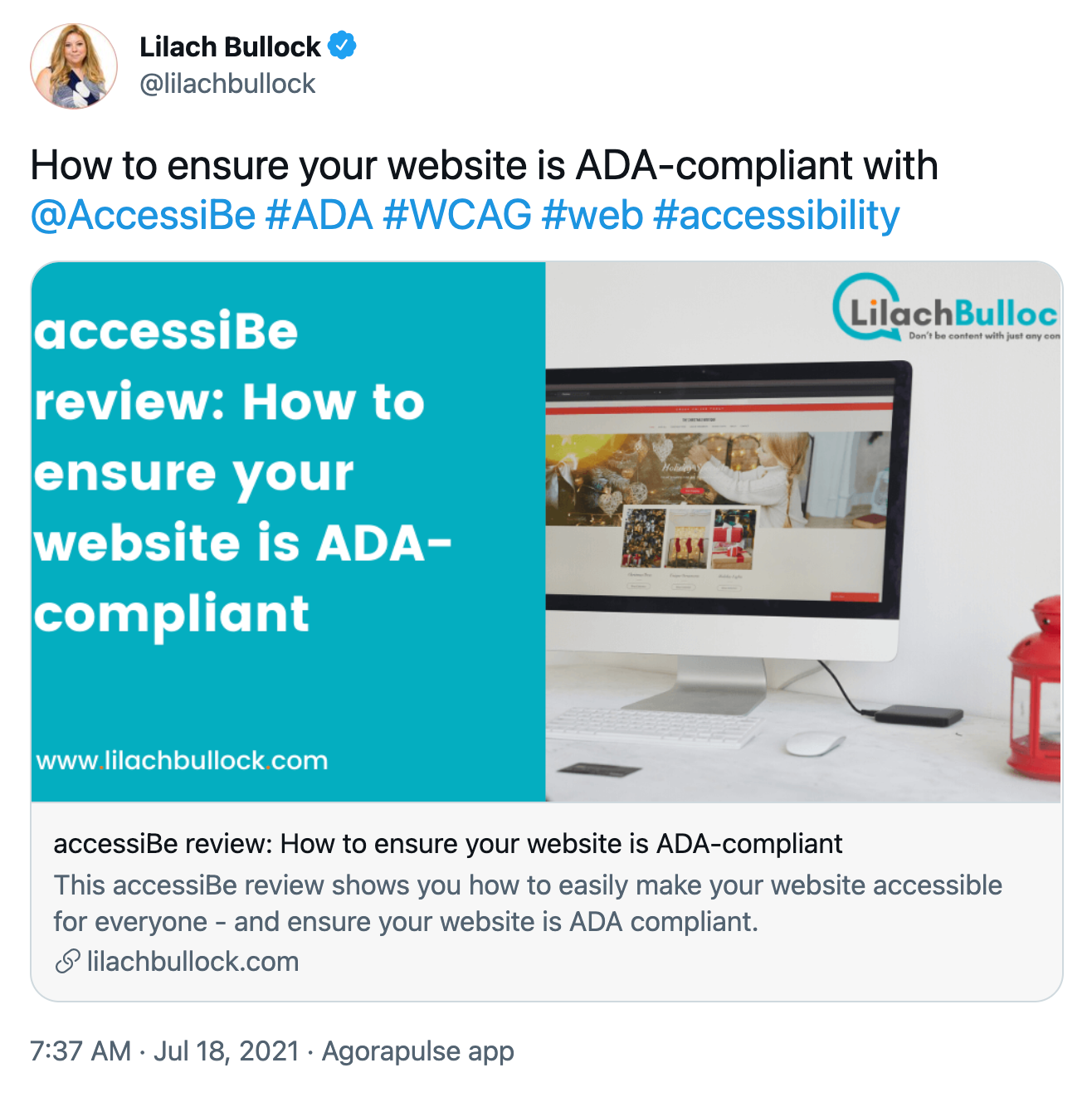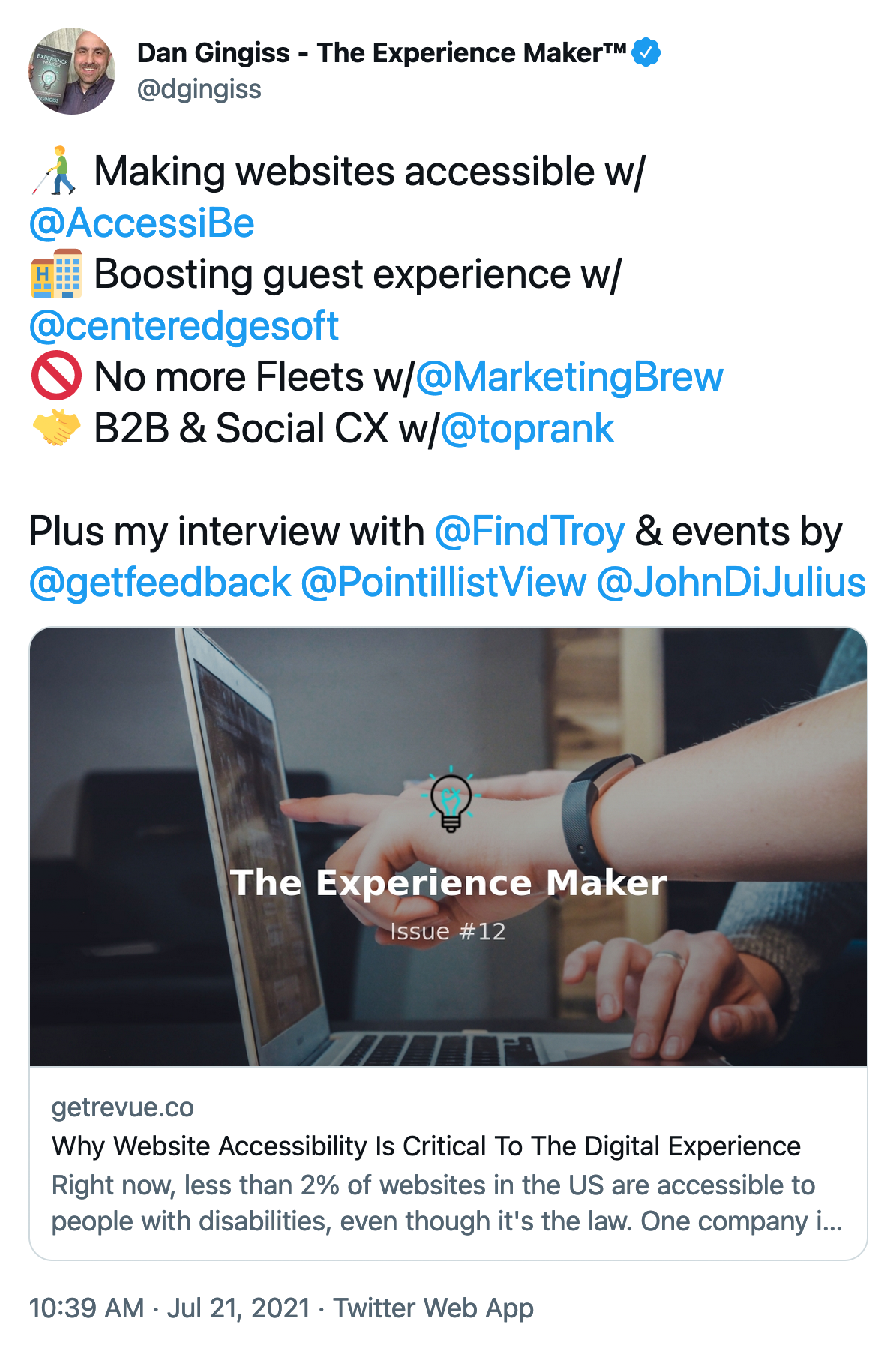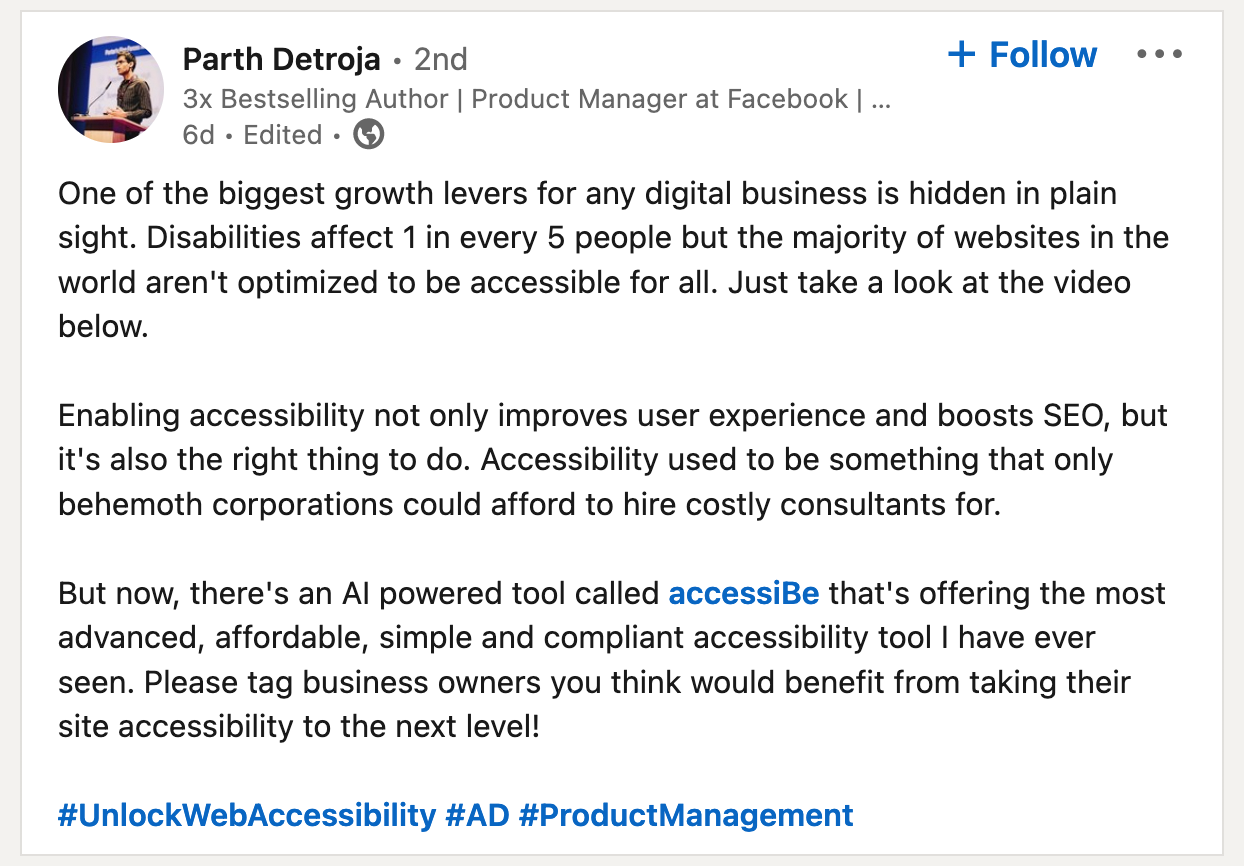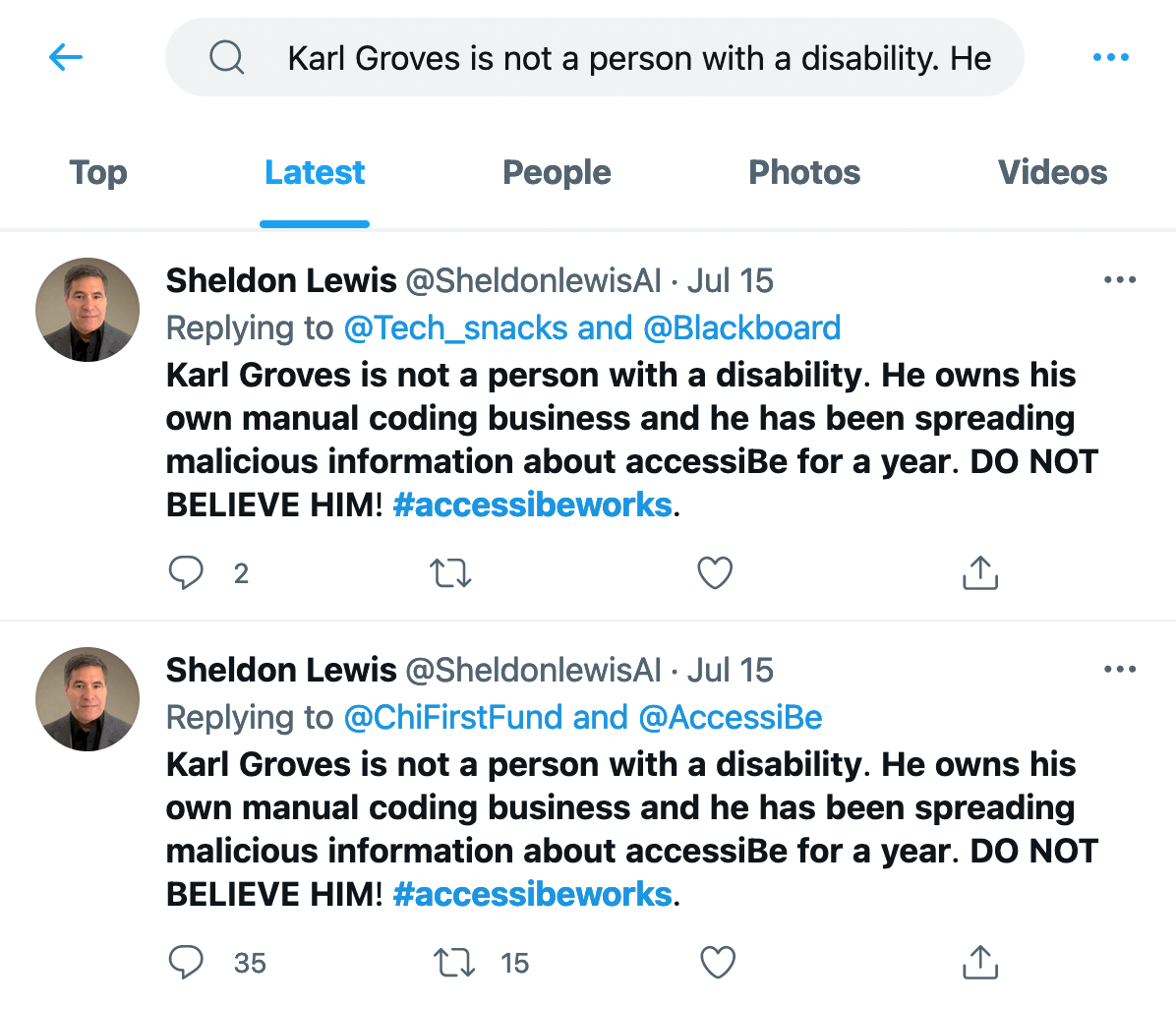If you're reading this and have already signed a contract with accessiBe, it unfortunately might be too late to get out of it.
In this scenario it is my recommendation to immediately stop creating harm for the people trying to use your website or web app. Remove accessiBe’s one line of embed code, ride out your contract’s remaining time, and don’t renew—treat the cost as lesson learned.
If you are unfamiliar with the concept of accessibility overlays, know this: Their modern form of a “quick fix” solution does not work, and using one will both:
- Prevent disabled people from using your website or webapp and,
- (ironically) increase your chances of getting sued.
This is not news. It is knowledge that has been painstakingly-assembled by others. The reason why you might not be aware of this is the focus of this post. Before we get any further, know that accessiBe:
- Has been condemned by the Federal Trade Comission
- Has been repeatedly identified as a source of inacessibility in lawsuits, failing to deliver on what its product promises,
- Is not recommended as a viable short or long-term strategy by Forrester,
- Was disavowed by The National Federation of the Blind because of their actions,
- Won’t comply with Data Protection Impact Assessment requests, and
- Was cautioned against by Haben freakin’ Girma herself.
Approach
One of the most insidious things about accessiBe is the way they target organizations. Broadly-speaking, this is how they go about getting business:
While there may be disabled people in the categories accessiBe is targeting, they're few and far between thanks to how pervasive ableism is in our society.
accessiBe capitalizes on this, positioning themselves as a turnkey way to avoid lawsuits. This is a horrible way to think about accessibility. Disability is a way of experiencing the world, not a problem to check off a list.
David vs. Goliath
The narrative accessiBe seems to be pushing is that they’re a scrappy startup underdog fighting the entrentched “establishment.” Here, the establishment are companies that perform manual auditing and remediation.
This is a very effective, dangerous message they’re crafting—a message that also could not be further from the truth. Considering the audience they target, the seeming ease of their solution, the time it takes to implement, and the feel good vibes of sticking it to the man make for a very compelling case.
accessiBe is not David, as much as they want you to believe it. They have venture capital (VC) backing, meaning that they have ~40 million dollars in operating capital even before you factor in profit from sales. They also have an estimated 60+ employees, and aggressive marketing efforts.
By the same token, manual auditing and remediation companies are not Goliath. Nor are they a monolith. Many of the companies in this category aren’t as large or as well-funded compared to accessiBe.
While the goal of both accessiBe and auditing companies is to be profitable, there’s a world of difference between how each organization goes about it.
The manual auditing model covers is a workflow that fixes the underlying issues, and doesn’t try to pave over them. Its process is:
- Taking stock of the state of things,
- Identifying and prioritize accessibility issues,
- Offer solutions on how to address these issues, and
- Educate the staff on how to not recreate these issues going forward.
accessiBe’s product does not do this. It de-centers disabled individuals and manifests as a rotting bandage placed over a septic wound. I could go into this in more detail, but I think Rachele DiTullio cuts to the heart of it:
#AccessiBe accuses its detractors of just being “competitors.”
— Rachele DiTullio (@racheleditullio) July 14, 2021
In reality, AccessiBe’s competition is fully accessible websites without overlays. They don’t make money if websites are accessible.
Groundswell
This isn’t a case of some grandiose Machiavellian, mafioso consortium gleefully separating companies from their money over the the threat of Americans with Disabilities Act (ADA) lawsuits. Nor is it a group of ambulance chasers, pouncing on hapless organizations after drive-by lawsuits manifest.
This is a case where the majority of the criticism of accessiBe come from disabled individuals affected by their product, not pre-existing competition.
These “establishment” accessibility businesses want to do a simple thing: ensure disabled people aren’t separated from their Civil Rights. A business is inaccessible because of a poorly-made website the same way a business is inaccessible because it does not facilitate wheelchair access. This is an incredibly important thing to be cognizant of, as more and more vital services go online.
The reason we’re hearing so much criticism about accessiBe in particular—and not the auditing companies that came before them—is that the auditing companies largely are successful in removing access barriers.
As to why our industry produces broken, inaccessible websites by default? That’s another conversation entirely.
Strings attached
So, why does accessiBe operate this way?
Taking VC money requires growth at all cost. In this case it's growth with a product that demonstrably makes things worse for the audience it purportedly serves. accessiBe is now in a position where it needs to take the product it used to secure VC funding and get new contracts for it at an exponential rate.
It doesn’t matter if the product itself is inaccessible. It doesn’t matter if the product creates net-new accessibility issues when installed. It doesn’t matter that it misrepresents the ADA. It doesn’t matter that disabled people hate the overlay and are forced to create workarounds. All that matters is profit.
It gets worse
accessiBe recently joined the W3C. To me, this reads as reputation-washing, a play to borrow the perceived authority of the web’s governing body to hide its own issues. I think it’s also a great example of how the scope of a code of conduct needs to include past and current behaviors when evaluating a prospective member.
accessiBe has also recently started targeting influencers. It’s a smart play: capitalize on ignorance to gain exposure. Cut a deal for the service and you have tens, if not hundreds of thousands of people exposed to the promotion.
This is aided by two other classic bad behaviors of an unscrupulous product: astroturfing product reviews and buying search placement.

This is to say nothing of Trumpian social media tactics:
Sockpuppeting:
This is an awesome sock puppet account!
— Karl Groves (@karlgroves) July 16, 2021
"Ben Gratiae" uses a picture of Martín Berardi from a company called Ternium out of Argentina.https://t.co/SNDRvZxWaF https://t.co/8ciXr8fSTf
And harassing and gaslighting disabled critics:
#Accessibe's @MHingson quotes me: @Accessibe's staff "needs to go re-examine itself and needs to decide that it's doing so much public harm that it doesn't have any reality connection with the world". This is no good-faith paraphrase: it's word salad designed to belittle
— Chancey Fleet 🌈👩🦯 (@ChanceyFleet) March 21, 2021
The veracity of these tactics hint that accessiBe is aware that they’re selling a faulty product, and need to drown out the dissenting voices.
accessiBe is also highly litigious—I’ll probably be threatened with a lawsuit for writing this. Let silencing their critics instead of publicly engaging with them be even more evidence of their unscrupulous business practices.
If accessiBe cared about actually helping disabled people, it would shift its business model to one of auditing and remediation. Sadly, that model does not align with growth at all costs for the sake of profit.
Dear purchasing manager
If one of your subordinates sent you this post, know that my agenda is a simple one.
I’m not an employee of a manual auditing company, nor do I receive any compensation for writing this post. All I want are accessible web experiences for my friends and family, their friends and family, and so on.
If you feel betrayed or defensive after learning about accessiBe, know that it means their strategies were working as intended. Your desire to do good has been taken advantage of by organized, well-funded opportunists that are profiting directly at the expense of a vulnerable population.
I hope that you don’t take these feelings out on your subordinate, and instead consider constructive action.
Removing accessiBe and investing in creating sustainable, usable digital experiences is a great way to get started. Increasing disability representation at your organization is also vital, and will help prevent something like this from happening again.
Translations
This post has been translated into Japanese by Okuto Oyama.
Further reading
- Honor the ADA: Avoid Web Accessibility Quick-Fix Overlays Law Office of Lainey Feingold
- There’s no such thing as fully automated web accessibility Anna E. Cook
- Is there a silver bullet for ADA website accessibility? Sorry, but the answer is no. Hunt Huey Accessibility Defense
- #accessiBe Will Get You Sued Adrian Roselli
- Background: Should I use an accessibility overlay? The A11Y Project
- AccessiBe and data protection? Léonie Watson
- It’s really this thing that gets me. Chris Coyier
- What a new accessibility class action lawsuit means for agencies Access Armada
- Overlay Fact Sheet overlayfactsheet.com



